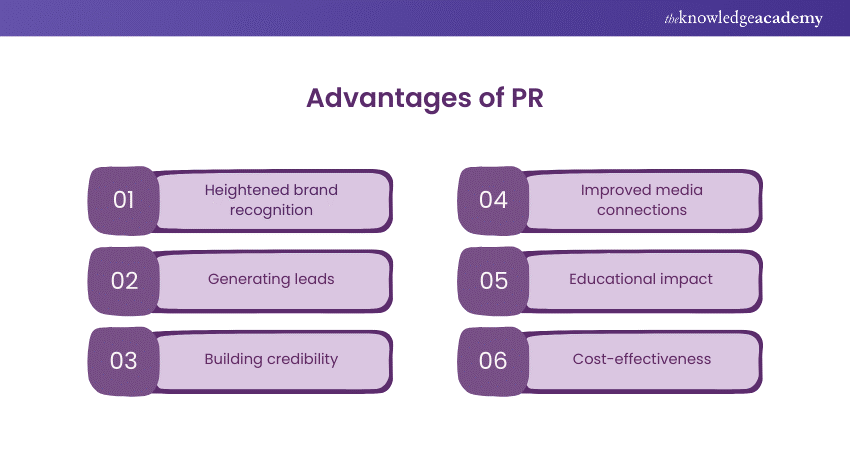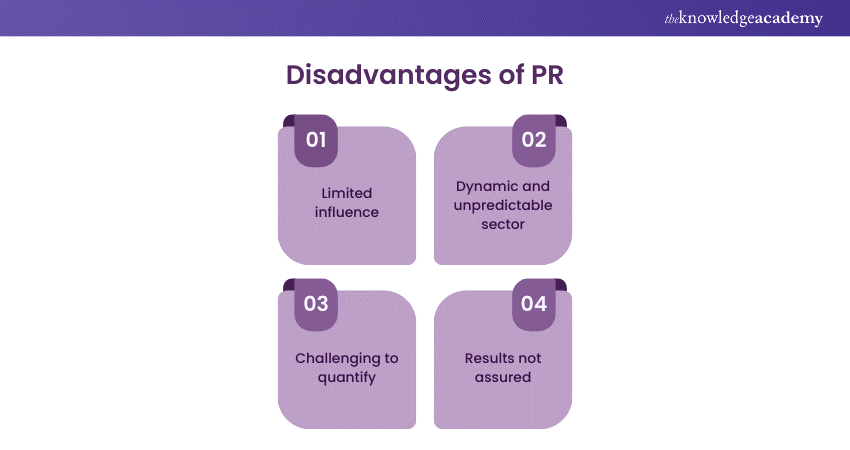We may not have the course you’re looking for. If you enquire or give us a call on +44 1344 203999 and speak to our training experts, we may still be able to help with your training requirements.
Training Outcomes Within Your Budget!
We ensure quality, budget-alignment, and timely delivery by our expert instructors.

Enter the world of Public Relations (PR), where communication strategies meet shaping a company's image. In this blog, we'll take a closer look at the ins and outs of PR, exploring its benefits and drawbacks. From boosting brand recognition to facing challenges like limited influence and measurement difficulties, PR plays a crucial role in shaping how organisations are perceived. Let's explore the Advantages and Disadvantages of Public Relations and uncover the strategies behind effective communication in today's fast-paced world.
Table of Contents
1) Advantages of PR
a) Heightened brand recognition
b) Generating leads
c) Building credibility
d) Improved media connections
e) Educational impact
f) Cost-effectiveness
2) Disadvantages of PR
a) Limited influence
b) Dynamic and unpredictable sector
c) Challenging to quantify
d) Results not assured
3) Conclusion
Advantages of PR
Public Relations (PR) is a strategic communication practice that helps organisations enhance their reputation, build relationships with key stakeholders, and achieve their communication objectives. Here, we explore six key advantages of PR and how they contribute to organisational success.

Heightened brand recognition
One of the main objectives of PR is to increase brand visibility and recognition. PR professionals ensure that a company's name and message are consistently communicated to its target audience through strategic storytelling, media engagements, and brand positioning initiatives.
By securing positive media coverage, leveraging social media channels, and participating in relevant industry events, PR efforts can elevate a brand's visibility, making it more recognisable and memorable to consumers. This heightened brand recognition increases top-of-mind awareness and fosters trust and familiarity, laying the groundwork for future engagement and loyalty.
Generating leads
In addition to enhancing brand recognition, PR initiatives can also serve as powerful lead-generation tools for organisations. PR efforts can attract potential customers and drive sales by positioning a company as an industry leader through thought leadership articles, expert interviews, and participation in relevant events.
By showcasing the company's expertise, innovation, and value proposition through strategic storytelling and authentic engagement, PR can effectively capture the interest and attention of target audiences, converting them into qualified leads and contributing to overall business growth and success.
Building credibility
Credibility is essential for building trust and confidence among consumers, investors, and key stakeholders. PR plays an important role in building and maintaining credibility by fostering authentic relationships, managing crises transparently, and showcasing expertise within the industry.
Through media placements, influencer partnerships, and community engagement initiatives, PR professionals can establish the organisation as a trustworthy and reputable entity, earning the confidence and loyalty of its stakeholders. Enhancing brand reputation, this credibility grants a competitive edge in the market, as consumers tend to favour products or services from companies they trust.
Improved media connections
PR professionals excel at cultivating relationships with journalists, bloggers, and other media influencers. These connections facilitate favourable coverage and positive publicity and provide valuable brand exposure and engagement opportunities. By nurturing these relationships through timely communication, mutual respect, and strategic collaboration, organisations can amplify their messaging and reach a broader audience.
Media connections enable organisations to share their stories, perspectives, and achievements with the public, positively shaping perceptions and influencing opinions. Additionally, positive media coverage can help organisations attract talent, investors, and customers, further contributing to their growth and success.
Educational impact
Beyond mere promotion, PR campaigns can also have a significant educational impact, informing and enlightening the public on important issues, initiatives, or innovations. By disseminating valuable content through various channels, such as press releases, social media posts, and sponsored events, organisations can position themselves as thought leaders and contribute to the intellectual discourse within their respective fields.
This educational aspect enhances brand reputation and fosters goodwill and trust among consumers. Organisations can empower their audience to make informed decisions and interact with their brand more meaningfully by offering valuable insights, information, and resources.
Cost-effectiveness
Compared to traditional advertising, PR offers a more cost-effective means of reaching target audiences and achieving communication objectives. While paid advertising requires substantial financial investment for guaranteed placement and exposure, PR leverages earned media, word-of-mouth endorsements, and organic content to achieve similar outcomes at a fraction of the cost.
Organisations can maximise their impact and ROI without breaking the bank by investing in strategic storytelling, media relations, and community engagement. This cost-effectiveness makes PR attractive for organisations of all sizes, allowing them to achieve their communication goals within budget constraints while maximising their reach and impact in the marketplace.
Unlock the power of persuasive storytelling with our Content Marketing Course – sign up now!
Disadvantages of PR
Public Relations (PR) is a powerful communication tool that can help organisations enhance their reputation, build relationships, and achieve their communication goals. However, like any other strategy, PR comes with challenges and limitations. Here, we explore four key disadvantages of PR and how they can impact organisational effectiveness.

Limited influence
One of the primary disadvantages of PR is its limited influence over media coverage and public perception. Unlike paid advertising, where companies have control over messaging and placement, PR efforts rely on the discretion of journalists, editors, and other gatekeepers of information. While strategic pitching and relationship-building can increase the likelihood of positive coverage, there are no guarantees.
Media outlets may choose to prioritise other stories or perspectives, resulting in limited visibility or unfavourable portrayals of the organisation. This lack of control over the narrative can leave organisations vulnerable to the biases and agendas of the media, undermining their ability to shape public opinion and protect their reputation effectively.
Dynamic and unpredictable sector
The PR field constantly evolves, shaped by shifting media trends, technological advancements, and cultural dynamics. Navigating this ever-changing landscape requires adaptability, agility, and a willingness to embrace innovation. Strategies that once proved effective may quickly become outdated or irrelevant, necessitating continuous learning and adjustment to stay ahead of the curve.
Furthermore, unforeseen events and crises can disrupt carefully laid plans, highlighting the unpredictable nature of the PR sector. Organisations must be prepared to pivot and recalibrate their strategies in response to emerging challenges and opportunities, ensuring their PR efforts remain relevant and effective in the face of change.
Challenging to quantify
Measuring the impact and effectiveness of PR initiatives can be notoriously challenging due to the lack of tangible metrics and quantifiable outcomes. Unlike advertising, where metrics such as impressions, click-through rates, and conversions provide clear insights into ROI, PR results are frequently intricate and challenging to quantify.
While media monitoring tools and sentiment analysis can offer some indication of success, attributing specific outcomes to PR efforts remains a complex and subjective endeavour. As a result, organisations may struggle to justify their PR investments and demonstrate tangible results to stakeholders. It hinders their ability to allocate resources effectively and make the right decisions about their communication strategies.
Results not assured
Despite meticulous planning and execution, there are no guarantees of success in PR. While organisations can control certain aspects of their PR strategies, such as messaging and outreach efforts, external factors beyond their control can influence outcomes. From changes in market conditions to unexpected crises and competitive pressures, numerous variables can impact the effectiveness of PR initiatives, leading to uncertain outcomes and potential setbacks.
As such, organisations must be prepared for the possibility of failure and develop contingency plans to mitigate risks and manage crises effectively. By adopting a strategic approach to PR, organisations can increase their chances of success and resilience in the face of uncertainty.
Learn to shape narratives and build relationships with our Introduction to Public Relations Course today!
Conclusion
The Advantages and Disadvantages of Public Relations are akin to the two sides of a coin. While PR can illuminate the path to brand success, it also harbours shadows of uncertainty. In the end, a balanced approach, acknowledging its power and pitfalls, is essential for any brand navigating the PR landscape.
Elevate your marketing prowess with our Marketing Courses – sign up today!
Frequently Asked Questions

A PR Specialist manages clients' public image, crafting media releases and developing social media programs to shape public perception and increase brand awareness.

To become a PR Specialist, one typically needs a communications, journalism, or marketing degree, followed by experience in media relations, writing, and campaign management.

The Knowledge Academy takes global learning to new heights, offering over 30,000 online courses across 490+ locations in 220 countries. This expansive reach ensures accessibility and convenience for learners worldwide.
Alongside our diverse Online Course Catalogue, encompassing 17 major categories, we go the extra mile by providing a plethora of free educational Online Resources like News updates, Blogs, videos, webinars, and interview questions. Tailoring learning experiences further, professionals can maximise value with customisable Course Bundles of TKA.

The Knowledge Academy’s Knowledge Pass, a prepaid voucher, adds another layer of flexibility, allowing course bookings over a 12-month period. Join us on a journey where education knows no bounds.

The Knowledge Academy offers various Marketing Courses, including Public Relations, Content Marketing and Email Marketing Courses. These courses cater to different skill levels, providing comprehensive insights into Digital Marketing.
Our Digital Marketing Blogs cover a range of topics related to Public Relations, offering valuable resources, best practices, and industry insights. Whether you are a beginner or looking to advance your Public Relation skills, The Knowledge Academy's diverse courses and informative blogs have you covered.
Upcoming Digital Marketing Resources Batches & Dates
Date
 Introduction to Public Relations
Introduction to Public Relations
Fri 17th Jan 2025
Fri 21st Feb 2025
Fri 4th Apr 2025
Fri 6th Jun 2025
Fri 25th Jul 2025
Fri 7th Nov 2025
Fri 26th Dec 2025







 Top Rated Course
Top Rated Course



 If you wish to make any changes to your course, please
If you wish to make any changes to your course, please


